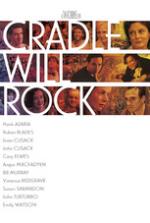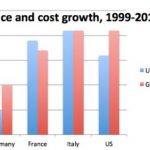 This article contains some of my reflections on the movie Cradle Will Rock. I’ve avoided it for 14 years for a very unfair reason. The last years of his life in America, Orson Welles went everywhere trying to get funding to make a movie about this same exact subject. But of course, who could trust Welles? He might make a masterpiece. It might even be popular. And wouldn’t that embarrass the entire Hollywood establishment going back at least two generations? And given the subject matter: leftist politics and specifically an indictment against the kinds of “artists” Hollywood holds in such high esteem? No no no! I’m sure Hollywood would have hired him to direct an episode of Columbo, but that’s about it. So that’s why I avoided the movie even though I think Tim Robbins is a perfectly capable director.
This article contains some of my reflections on the movie Cradle Will Rock. I’ve avoided it for 14 years for a very unfair reason. The last years of his life in America, Orson Welles went everywhere trying to get funding to make a movie about this same exact subject. But of course, who could trust Welles? He might make a masterpiece. It might even be popular. And wouldn’t that embarrass the entire Hollywood establishment going back at least two generations? And given the subject matter: leftist politics and specifically an indictment against the kinds of “artists” Hollywood holds in such high esteem? No no no! I’m sure Hollywood would have hired him to direct an episode of Columbo, but that’s about it. So that’s why I avoided the movie even though I think Tim Robbins is a perfectly capable director.
I watched the movie in two settings. The first act is weak. The only thing that really worked was the stylish way that it showed Marc Blitzstein writing the play The Cradle Will Rock. (Note “The” to distinguish it from the film itself.) There is nothing particularly brilliant about it; you’ve seen it in dozens of movies, but it works. And he gets constant advice from his dead wife and Bertolt Brecht, who of course, wrote all of the words of The Threepenny Opera. There is a funny bit that is repeated about adding more prostitutes. Blitzstein has only one. With one she’s just a signifier. There are lots of prostitutes; and it’s only a job title for a tiny fraction of them.
There are basically two plot lines. There is the production of The Cradle Will Rock. And then, there is the story of the efforts to get the Federal Theatre Project (FTP) shut down. In reality, there were any number of people who were complaining, but the film focuses on Hazel Huffman (Joan Cusack), who spoke to the committee for three days about communist infiltration in the FTP that she had seen in her position as a mail clerk for the program. The film has some excellent moments of testimony, that demonstrate that nothing has changed. Hearings are still the same kangaroo courts they’ve always been.
After the first act, the film really picks up and becomes a joy to watch. While the government is trying to stop The Cradle Will Rock from being performed, Nelson Rockefeller is having big problems with the mural that he had Diego Rivera paint. One of the many problems he has is that Rivera has painted a cocktail party of the power elites with a giant syphilis cell hovering over it. So as the theater group gets to produce its unusual version of The Cradle Will Rock, we see Rivera’s mural being destroyed. But when the job is done, all that we can still recognize is that syphilis cell. A little heavy-handed? Perhaps, but I loved it. In fact, the film should have ended there. But it didn’t.
There was a mock funeral for the FTP. And at the end, the camera tilts up, and it is no longer 1937. It is Times Square today where everything is a commodity. Really?! That’s how you want to end it? It would have been no less subtle for Tim Robbins to come on the screen and say, “I’m talking about today, folks!” Except, that isn’t really where we are. In 1937, workers’ rights were on the rise. There would be decades of prosperity until the power elite started to take back their power, first slowly in the 1947 and then very quickly from the mid-1970s onward. The problem in 1937, was that we allowed that syphilis cell of the power elite to live, and slowly destroy our nation.
The best scene in the film has to do with a minor subplot. It is where Tommy Crickshaw (Bill Murray) walks past his two ventriloquist pupils who he hates. One of them asks if he will look at their new act. It’s implied that it will be a scathing attack against him for testifying against the FTP. Crickshaw says, “You’re reds. I don’t talk to reds.” One of the pair, Sid (Jack Black), gets a quizzical look on his face and says, “We’re not red, darling. Pink. Like a flower. We’re homosexuals? Not communists! You thought we were communists?!” They both laugh and the other says, “Oh, that’s rich!” It was established at the beginning of the film that the Communist Party would not accept homosexuals. It’s an interesting juxtaposition and kind of explains humanity very simply: people don’t like others who aren’t like them. So in this particular case, the people complaining about the FTP have lots of different reasons for being against it—racism, sexual hangups, politics—but it’s all the same: fear of the Other. Interestingly, one Other that the power elite do not fear are the fascists.
The end of the film feels triumphant. But it really isn’t. We the people are allowed temporary victories. But in the end, the power elite always wins. And it isn’t just the fact that they cause people to starve in the land of plenty—or to suffer in the land of luxury. It is that they restrict our cultural values. They defile our art. They are the people who oppressed Michelangelo 500 years ago, but now admire him as the great artist he was. These are the people who, if they had had the power would have destroyed everything he did, so the power elite of today couldn’t think of themselves as oh so deep for their appreciation now.
If we allow them, in 500 years, the only art that will remain of the turn of the 21st century will be Everybody Loves Raymond.
Afterword
After Hazel Huffman testifies before congress and gets the FTP cut by 20%, all of her co-workers are angry at her. They won’t even speak to her. She’s sure it is because they are communists or sympathizers. But that’s not it at all. As I am fond of pointing out: 95% of the people just want to live their lives. They want to go to their kids’ school plays and have barbecues and maybe watch some television. Huffman made a big theoretical stand against communists and miscegenation. But nothing she did made the country better or safer. All it did was cause 3,000 people to lose their jobs. I forgive her. She was only 26 years old. As we get older, we become more practical. That’s why I’m a Democrat. It’s the practical party. It’s the party that does things because they work, or at least might work. The Republican Party—ironically made up of mostly older voters—is the party of theory. They are the ones who think that since it is theoretically possible that unemployment benefits will lull workers into complicity, we ought to let their children starve. When you’re 26, what do you know? But the Republican Party isn’t made up of a bunch of 26-year-olds. So what is their excuse?





